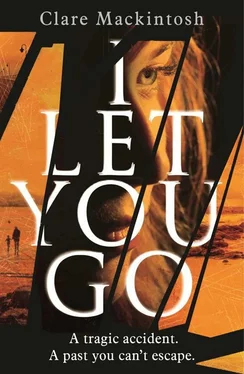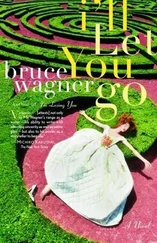Court would be sitting in the next ten minutes. Ray drummed his fingers on his desk. Something about the name Petersen was nagging him. It felt familiar.
‘She told me she was married once: I assumed she was divorced.’
Ray and Kate exchanged glances. Ray picked up the phone and called the court. ‘Has R v Gray been called yet?’ He waited while the desk clerk checked the court list.
Petersen, not Gray. What a cock-up.
‘Okay, thanks.’ He replaced the handset. ‘Judge King’s been delayed – we’ve got half an hour.’
Kate sat forward. ‘That report I gave you the other day – after you sent me to deal with the woman at the front counter. Where is it?’
‘Somewhere in my in-tray,’ Ray said.
Kate began rifling through the paperwork on his desk. She picked up three files from the top of Ray’s in-tray and, finding herself with no free space on the desk, dumped them on the floor. She leafed quickly through the remaining paperwork, discarding each unwanted page and picking up the next in seconds.
‘That’s it!’ she said triumphantly. She pulled out the report from its plastic wallet and dropped it on to Ray’s desk. A handful of torn photo pieces fluttered on top of it and Patrick picked one up. He looked at it curiously, then glanced up at Ray.
‘May I?’
‘Be my guest,’ Ray said, not completely clear what he was giving permission for.
Patrick gathered up the sections of photograph and began piecing them together. As the photo of Penfach Bay took shape in front of them, Ray let out a low whistle. ‘So Jenna Gray is the sister Eve Manning is so worried about.’
He sprang into action. ‘Mr Mathews, thank you for bringing the passport. I’m afraid I’m going to have to ask you to wait for us at the court. Rachel at the front desk will direct you. We’ll be there as fast as we can. Kate, meet me at DAU in five minutes.’
As Kate escorted Patrick downstairs, Ray picked up the phone. ‘Natalie, it’s Ray Stevens from CID. Can you see what you’ve got on an Ian Petersen? White male, late forties…’
Ray ran down a flight of stairs and along a corridor through a door marked Protective Services. A moment later Kate joined him, and together they rang a buzzer for the Domestic Abuse Unit. A cheery-looking woman with cropped black hair and chunky jewellery opened the door.
‘Did you find anything, Nat?’
She showed them in and swivelled her computer screen to face them. ‘Ian Francis Petersen,’ she said, ‘born twelfth April 1965. Previous for drink drive, aggravated assault and currently the subject of a restraining order.’
‘Against a woman called Jennifer, by any chance?’ Kate said, but Natalie shook her head.
‘Marie Walker. We supported her to leave Petersen after six years of systematic abuse. She pressed charges, but he got off. The restraining order was granted at civil court and is still in place.’
‘Any history prior to Marie?’
‘Not with partners, no, but ten years ago he was cautioned for common assault. On his mother.’
Ray felt bile rise in his throat. ‘We think Petersen is married to the woman involved in the Jacob Jordan hit-and-run,’ he said. Natalie stood up and walked towards a wall full of grey metal filing cabinets. She pulled out a drawer and flicked through the contents.
‘Here it is,’ she said. ‘This is everything we’ve got on Jennifer and Ian Petersen, and it doesn’t make pleasant reading.’
45
The exhibitions you held were tedious. The venues were different: converted warehouses; studios; shop floors, but the people were always the same: ranting liberals in coloured scarves. The women were hairy and opinionated; the men insipid and under the thumb. Even the wine lacked personality.
During the week of your November exhibition you were particularly difficult. I helped you take your pieces to the warehouse three days early, and you spent the rest of the week there, getting ready.
‘How long does it take to set out a few sculptures?’ I said, when you came in late for the second night in a row.
‘We’re telling a story,’ you said. ‘The guests will move through the room from one sculpture to another, and the pieces have to speak in the right way to them.’
I laughed. ‘You should hear yourself! What a load of rubbish. Just make sure the price tag is nice and easy to read, that’s all that matters.’
‘You don’t have to come, if you don’t want to.’
‘Don’t you want me there?’ I eyed you suspiciously. Your eyes were a little too bright; your chin a little too defiant. I wondered what had caused such sudden joie de vivre.
‘I just don’t want you to be bored. We can manage.’
There it was: the flash of something unreadable in your eyes.
‘We?’ I said, raising an eyebrow.
You were flustered. You turned away and pretended to busy yourself with the washing-up. ‘Philip. From the exhibition. He’s the curator.’
You began wiping a cloth around the inside of a pan I had left to soak. I moved to stand behind you, pressing you between my body and the sink so my mouth was level with your ear. ‘Oh, he’s the curator , is he? Is that what you call him when he’s fucking you ?’
‘It’s nothing like that,’ you said. Ever since your pregnancy you had adopted a particular tone of voice when I spoke to you. It was excessively calm; the sort of voice you might use when talking to a screaming child, or the clinically insane. I hated it. I moved a fraction backwards, and felt you breathe out, then I pushed you forward again. I guessed from the sound you made that you were winded, and you put both hands on the edge of the sink to get your breath back.
‘You’re not fucking Philip?’ I spat the words out on to the back of your neck.
‘I’m not fucking anyone.’
‘Well, you’re certainly not fucking me,’ I said, ‘not lately, anyway.’ I felt you tense, and I knew you expected me to slide a hand between your legs; wanted it, even. I was almost sorry to disappoint, but your skinny backside held little attraction for me by then.
On the day of the exhibition I was in our bedroom when you came upstairs to get changed. You hesitated.
‘It’s nothing I haven’t seen before,’ I said. I found a clean shirt and hung it on the back of the wardrobe door; you laid your outfit out on the bed. I watched you shrug off your tracksuit bottoms and fold up your sweatshirt for the next day. You wore a white bra and matching pants, and I wondered if you had chosen the colour deliberately to contrast with the bruise on your hip. The swelling was still noticeable, and when you sat on the bed you winced, as though making a point. You put on wide linen trousers and a voluminous top in the same fabric, which hung off your bony shoulders. I chose a necklace of fat green beads from the jewellery tree on your dressing table.
‘Shall I put this on for you?’
You hesitated, then sat on the little stool. I put my arms over your head and held the necklace in front of you, and you lifted your hair out of the way. I moved my hands to the back of your neck, tightening the pressure of the necklace against your throat for a split-second, and feeling you tense in front of me. I laughed and fastened the clasp. ‘Beautiful,’ I said. I bent down and looked at you in the mirror. ‘Try not to make a fool of yourself today, Jennifer. You always humiliate yourself at these things by drinking too much and fawning over the guests.’
I stood up to put on my shirt, choosing a pale pink tie to go with it. I slipped on my jacket and looked in the mirror, satisfied with what I saw. ‘You may as well drive,’ I said, ‘as you won’t be drinking.’
I had offered on several occasions to buy a new car for you, but you had insisted on keeping your battered old Fiesta. I went in it as little as possible, but I had no intention of letting you drive my Audi after you dented it trying to park, so I sat in the passenger seat of your filthy car and let you drive me to the exhibition.
Читать дальше












